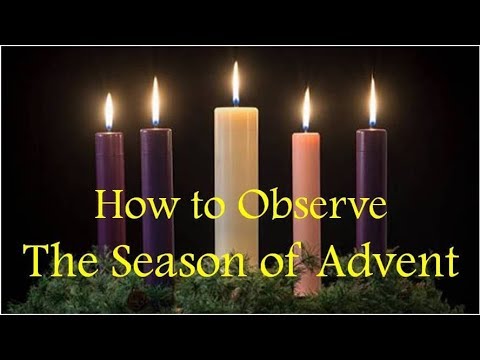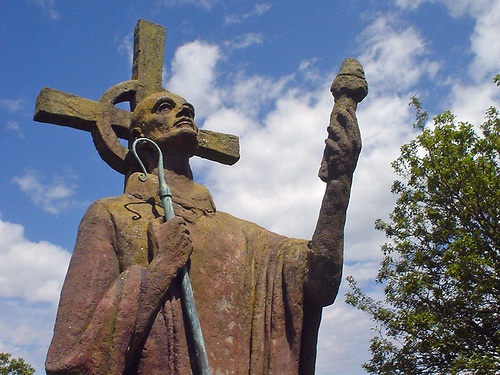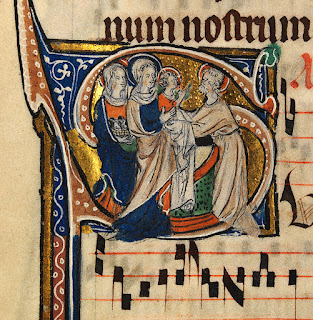 |
| Advent is a season of beauty, expectation, and penitence. |
Advent is frequently a misunderstood season today, and thus often not fully experienced. It is typically reduced to wreaths, candles, and a countdown to Christmas (or, even a sort of prolonged "pre-function" to Christmas) involving chocolate-filled calendars. It is far more than that. Advent is a complex season with multiple dimensions and a strong call to engage in repentance -- yes, repentance.
This is a penitential season – despite the occasional cavil from more recent liturgical experts – but not in the same way as Lent. Advent’s preparation for the Feast of the Nativity of Christ is marked by a high degree of eschatological expectation, for Advent is really a preparation for two “comings” of Christ: his “coming amongst us in great humility” as the Collect for the First Sunday of Advent says and which we celebrate at Christmas, and “when he comes again in majesty to judge both the quick and the dead” at the Last Judgement. Both require serious and considered preparation. This is why St. John the Baptist and his urgent call to prepare for the coming of the Lord features so strongly in the readings, prayers, and hymns for these weeks.
Because true Christian belief and practice about the Last Judgement is founded upon hope and joy (rather than fear and anxiety), any sense of trepidation about the “Last Things” is a sign that we have spiritual work to do – and who among us is free from this ongoing work “now in the time of this mortal life” as the great Advent Collect puts it? Advent, with its focus on expectation and preparation, naturally serves as a time to consider what needs repentance and reconciliation in our life.
This is all very well to say, but how do we respond? The Prayer Book provides some clear direction.
First, there is the matter of examining our conscience. By engaging in this practice, we are led to see what the Holy Spirit is prompting us to address at this juncture in life. Tools for this work abound in the Book of Common Prayer:
· The Ten Commandments (from the Penitential Order in the Holy Eucharist)
· The Summary of the Law (from the same place)
· The five baptismal promises found in the Baptismal Covenant (in the Baptismal liturgy)
· The Litany of Penitence (from the Ash Wednesday liturgy)
· The Great Litany
· The Catechism
· The Psalms & Collects
There are, of course, many other tools for examining our conscience (reading from the Sermon on the Mount is one, or one might use one of the traditional forms found in such non-BCP resources as The St. Augustine’s Prayer Book).
Once we have spent time in careful consideration about what is at issue, it then follows that we confess to God our sins and receive assurance of God’s pardon. In the Anglican and catholic tradition of the faith, there are three such forms: Private Confession, General Confession, and Sacramental (auricular) Confession.
Private Confession is what we do on a daily basis in our own private prayers. It is often how we approach the Confession in Morning / Evening Prayer or the bedtime service of Compline when said alone (though, one must always remember, these services are always liturgical services and thus part of the whole Church's offering, even if said alone).
This is our regular application of what Jesus teaches in the Lord’s Prayer: “Forgive us our trespasses as we forgive those who trespass against us.” Confessing our sins to God should be a natural part of life – not as an act of shame or scrupulosity, but openness and candor with our God. It may be done at any time and it is indeed good to become able to confess quickly, just as the Lord's Prayer suggests. It will help up learn to forgive others quickly, as well.
General Confession takes place in community, in the context of Morning or Evening Prayer when gathered in church, or at the Holy Eucharist as we prepare to receive the Holy Mysteries of Christ. It reminds us that sin is never a purely private matter (a “victimless crime”), but always impairs our relationships with both God and neighbor.
This form of confession is closer to how the earliest Christians confessed their sins to one another, and thus connects us to the ancient Church’s pattern of acknowledging sin as a body. It is also an important (essential) part of participating in public worship and particularly in receiving the Holy Sacrament. One other point: General Confession is followed by the priest/bishop pronouncing an assurance of pardon, making clear that our confession and repentance is predicated on God’s mercy eternally offered in Christ's death upon the cross; the ordained minister is not a magical pipeline of that forgiveness: it is a declaration of that eternal al forgiveness over God’s penitent people assembled for worship.
Finally, there is Sacramental or Auricular Confession. Here, a penitent confesses to God and the Church in a private manner – with only a priest present. This form of confession is especially appropriate for sins of a serious nature, for old sins which have long continued to plague one’s conscience, for relapses into past patterns, at the end of life or when preparing for confirmation, marriage, ordination, or other major changes in our life, or when God’s forgiveness seems far away.
Sacramental Confession is a part of the Church’s healing ministry and is directly connected to our baptism. It is essentially spiritual medicine and may be received either at posted times in the church’s schedule, or by special arrangement with the priest.
Advent’s brevity is actually one of its best features: it makes clear that the time for setting our house in order is limited, and that God awaits our cooperation for our healing and renewal. The joyful expectation which marks the season is also a summons to enter into this work with alacrity and zest: God desires our freedom and has come amongst us to secure it. It is now time for us to respond by discernment and repentance so that we may enter more fully into the joy set before us – a joy begun at Christ’s nativity and culminating in the final “setting to rights” of all things in the love and truth of Christ’s return.
Let us all make this Advent season now begun a profitable season of spiritual renewal and restoration, “now in the time of this mortal life.” By entering into a careful consideration of our conscience and appropriate repentance, followed by confession in the full assurance of God’s loving pardon, we may come to Christmas with a greater joy and a less burdened heart, ready to celebrate and live with our eyes firmly fixed on that day when, by God’s grace, “we may rise to the life immortal,” already begun in our life in Christ now.
Almighty God, give us grace that we may cast away the
works of darkness, and put upon us the armor of light, now
in the time of this mortal life in which thy Son Jesus Christ
came to visit us in great humility; that in the last day, when
he shall come again in his glorious majesty to judge both the
quick and the dead, we may rise to the life immortal; through
him who liveth and reigneth with thee and the Holy Ghost,
one God, now and for ever. Amen.





